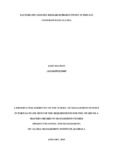| dc.contributor.author | MACHYO, Jane | |
| dc.contributor.author | Dr.Bigabwenkya, Sebastian (Supervisor) | |
| dc.contributor.author | Dr. Ssesanga, Karim (Supervisor) | |
| dc.date.accessioned | 2017-06-05T08:19:04Z | |
| dc.date.available | 2017-06-05T08:19:04Z | |
| dc.date.issued | 2015-01 | |
| dc.identifier.citation | APA | en_US |
| dc.identifier.uri | http://hdl.handle.net/20.500.12305/155 | |
| dc.description | A Dissertation Submitted to the Higher Degrees Department in Partial Fulfillment of the Requirements for the Award of a Master’s Degree in Management Studies (Project Planning and Management Option) of Uganda Management Institute. | en_US |
| dc.description.abstract | This study analysed the influence of research productivity in Private Universities in Uganda. The objectives included; to find out whether the organisational culture has an effect on Research productivity, to establish the effect of employee job satisfaction on research productivity and to establish the relationship between resource availability and research productivity. Research Productivity in universities has remained low in publication counts, affecting the web rankings of different universities. As such determining academic staff tenure, promotion and the reward systems becomes complex. Case study design using quantitative and qualitative approach was adopted to explore the objectives .A questionnaire was administered to only academic staff (N=148) and the response rate was at 70%. Interviews were conducted for the 3 Librarians; 3 Research Unit Directors and 3 Post Graduate Directors. The analysis was done using the Statistical Package for Social Scientists (SPSS) software and 75 variables were analyzed in the dimensions of culture, employee job satisfaction, resource availability. The Pearson correlation coefficient was used to ascertain the relationship between the variables as well answering the hypothesis. The measure of reliability of the instruments took on the Cronbach Alpha (0.9).The findings showed academic staffs were not quite sure of the research, person and reward culture, and employee job satisfaction reflected agreement to the variables where a level of job insecurity is evident. Resource availability revealed inadequate information about the available information to support the research. In conclusion research outputs were still relatively low in Universities, academics staffs‟ involvement in research was influenced by job insecurity, there seems to be little or no information about the available resources that foster the growth of research. The study recommended establishment of reward systems, development of proper communication procedures and establish networks with other institutions. | en_US |
| dc.language.iso | en | en_US |
| dc.publisher | Uganda Management Institute | en_US |
| dc.subject | Research Productivity | en_US |
| dc.subject | Private Universities | en_US |
| dc.title | Factors Influencing Research Productivity in Private Universities in Uganda | en_US |
| dc.type | Thesis | en_US |

